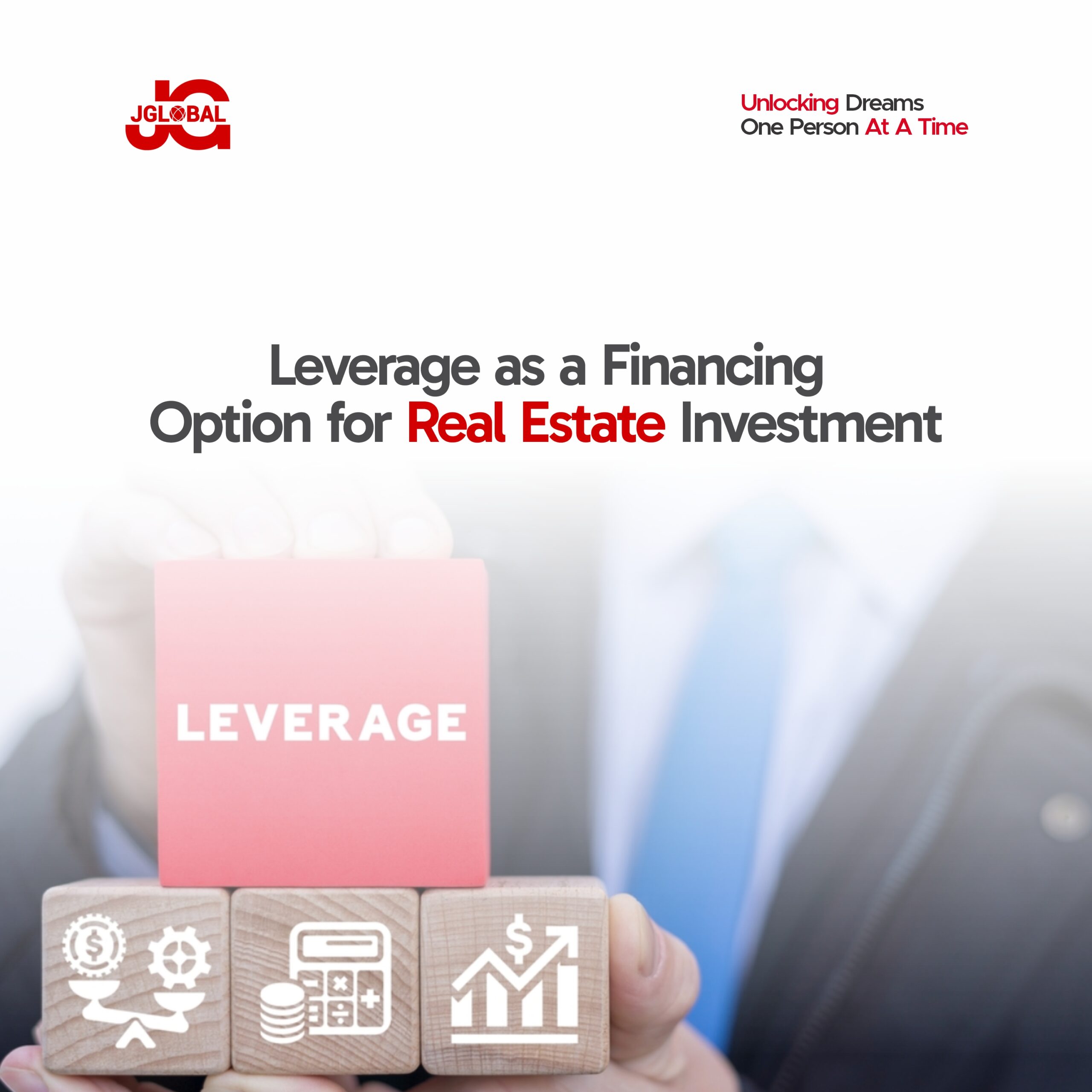LEVERAGE AS A FINANCING OPTION FOR REAL ESTATE INVESTMENT

Are you thinking of borrowing money to invest in Nigerian real estate? Hold on! Don’t rush into it without understanding the process. Many people borrow without knowing the ropes, and that can lead to financial trouble.
As a real estate advisor, I’ve seen this happen too many times. That’s why I want to share my expertise with you. I’ll show you how to use leverage safely and effectively.
In this article, we will break it down together:
– What is leverage, and how does it work?
– What are your options for borrowing money?
and many more.
WHAT IS LEVERAGE IN REAL ESTATE?
Leverage is using borrowed money to finance a portion of your real estate investment. It allows you to control a larger asset with a smaller amount of your own capital.
HOW DOES LEVERAGE WORK?
Let’s say you want to buy a ₦20 million property in Ikoyi, Lagos. You put down 20% (₦4 million) and borrow the remaining 80% (₦16 million) from a lender. This is an example of 80% leverage.
TYPES OF LEVERAGE OPTIONS
- Mortgages:
When it comes to financing a property, mortgages are often the first option that comes to mind. This traditional bank financing is available for both residential and commercial properties. Note that, with a mortgage, you can borrow a significant amount of money to purchase a property, and then repay it over time with interest. It’s a straightforward and widely available option, making it a popular choice among property buyers.
- Private Money Loans:
Private money loans offer quick access to cash, but they often come with a price. These short-term loans from private lenders could have high interest rates, which can add up quickly. They are usually used for urgent or temporary financing needs, such as renovating a property or covering unexpected expenses. Be cautious when considering private money loans, as the high interest rates can put a strain on your finances.
- Partnerships:
Partnering with investors or companies can be a smart way to finance your property ventures. By sharing equity and debt, you can spread the risk and reward among multiple parties. This option allows you to tap into other people’s resources and expertise, potentially leading to more successful investments. However, partnerships require careful planning and communication to ensure everyone’s interests are aligned.
- Home Equity Loans:
If you already own a property, you can leverage its equity to secure additional financing. Home equity loans allow you to borrow against the value of your existing property, using it as collateral. This option can provide access to funds for renovations, new investments, or other financial needs. Just be mindful of the risks, as you are putting your existing property on the line.
STRATEGIES FOR EFFECTIVE LEVERAGE IN FINANCING
1. Start Small: Begin with lower leverage ratios (e.g., 60%) and gradually increase.
2. Choose the Right Property: Select properties with strong potential for appreciation or cash flow in areas like Ikoyi, Epe, or emerging locations.
3. Understand and Monitor Interest Rates: Keep an eye on rates and adjust your strategy accordingly. Read through the different rates and ensure you won’t be paying more than what is expected. For example, 1% per month for 12 months means 12% per annum.
4. Diversify: Spread risk across multiple properties or asset classes.
UNDERSTANDING LEVERAGE RATIOS IN NIGERIA
When it comes to borrowing money for a property, lenders use something called leverage ratios to determine how much they are willing to lend. Essentially, this ratio shows how much of the property’s value they’re willing to finance.
Residential mortgages lenders typically offer 70-80% leverage. This means if you are buying a 20 million naira home, the lender might give you a loan of 14-16 million naira and you will need to cover the remaining 4-6 million naira as a down payment.
Commercial mortgages work similarly but with slightly lower leverage. Lenders usually offer 60-75% of the property’s value. So for a 50 million naira commercial property you might get a loan of 30-37.5 million naira and you need to put down 12.5-20 million naira.
Private money loans have stricter leverage ratios typically ranging from 40-50%. This means you will need to put down more of your own money upfront. For example a 10 million naira private loan might require a 5-6 million naira down payment.
Finally when it comes to equity or down payments lenders usually require 20-30% of the property’s value. This shows you are committed to the investment and reduces the lender’s risk.
COMMON LENDERS IN NIGERIA
1. Commercial banks (e.g., First Bank, Zenith Bank)
2. Mortgage banks (e.g., Federal Mortgage Bank of Nigeria, Infinity trust mortgage bank)
3. Private lenders (e.g.,Finance and commercial service ltd, individual investors)
CONCLUSION
Leverage can be a powerful tool for Nigerian real estate investors. By understanding how leverage works, choosing the right financing options, and managing debt effectively, you can grow your real estate portfolio.
KEY TAKEAWAYS:
1. Consult with a financial advisor or real estate expert.
2. Carefully evaluate property potential and market conditions.
3. Monitor and adjust your leverage strategy as needed.
4. Explore alternative financing options.




[…] Read more on what leverage means here […]